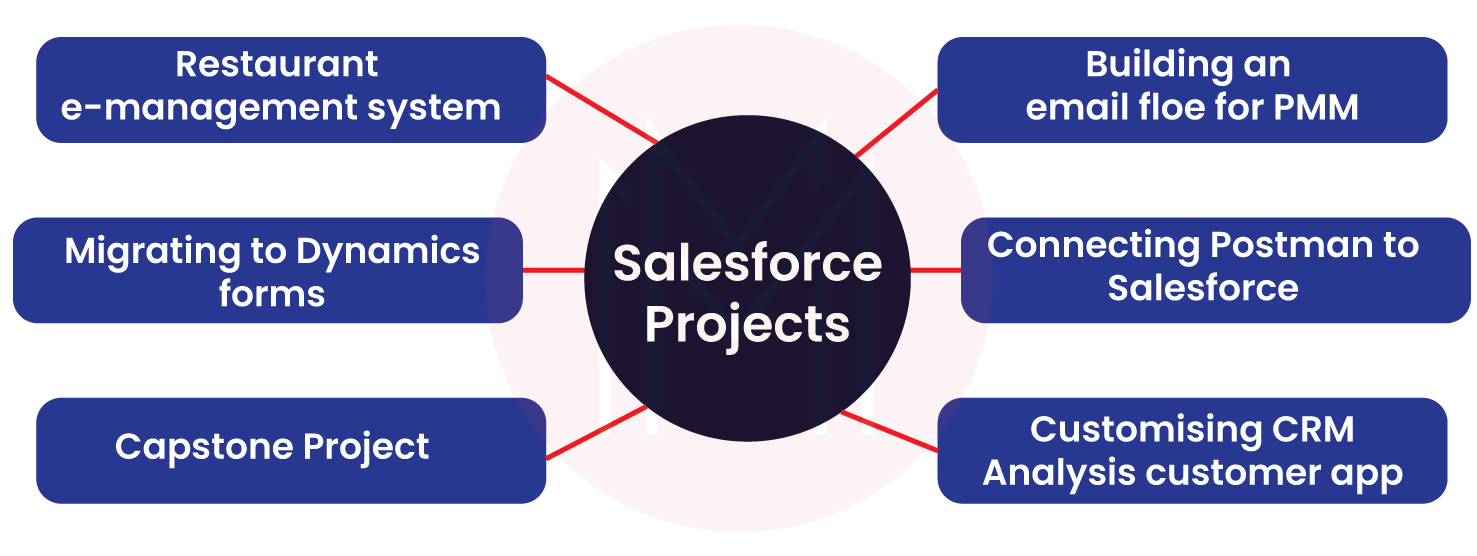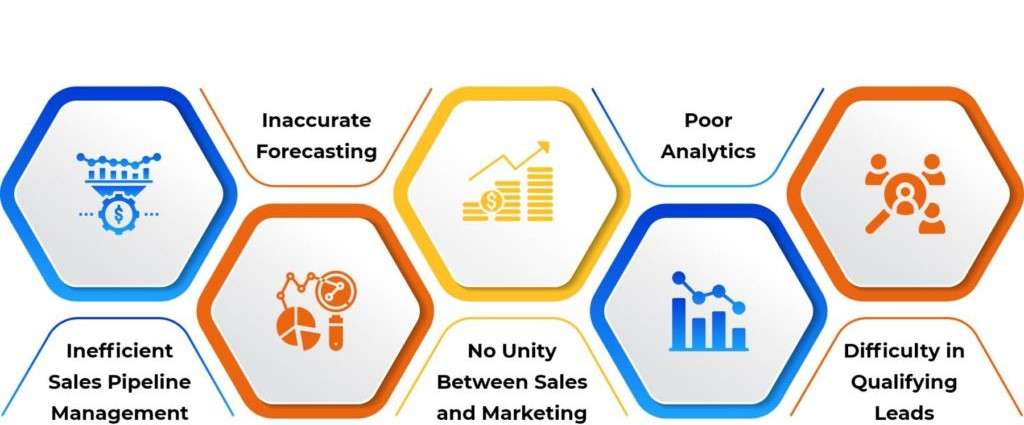
- Introduction to Salesforce Projects
- Overview of Salesforce Projects
- Importance of Hands-On Projects
- Types of Salesforce Projects (Admin, Dev, etc.)
- Benefits of Working on Real-Time Projects
- Common Challenges in Salesforce Projects
- Tools and Technologies Used
- Conclusion
Introduction to Salesforce Projects
Salesforce projects involve the implementation, customization, and optimization of Salesforce’s CRM platform to meet specific business requirements. These projects can range from basic administrative tasks, such as user management and configuration, to complex development efforts, including custom app building, automation, and data integration. Organizations use Salesforce projects to streamline business processes, improve customer relationship management, and enhance overall productivity. A successful Salesforce project requires a blend of technical expertise, business analysis, and project management skills. Whether it involves customizing standard objects, creating automation flows, or integrating third-party applications, each project aims to deliver a tailored solution that aligns with business goals. To build the necessary skills, consider taking Salesforce Training to effectively contribute to or manage these projects.
Overview of Salesforce Projects
Salesforce projects typically follow a structured lifecycle, including planning, design, development, testing, deployment, and post-implementation support. The process begins with requirement gathering, where stakeholders define the project objectives and desired outcomes. The design phase involves creating a blueprint of the solution architecture, including data models, workflows, and security configurations. During development, Salesforce admins and developers build the solution using Salesforce tools such as Lightning App Builder, Apex, Visualforce, and Flow Builder. For marketing-focused implementations, integrating tools like the Pardot Marketing Automation Tool can enhance lead nurturing and campaign tracking. Once developed, the solution undergoes rigorous testing to ensure functionality and performance. The final step is deployment, where the project is released into the production environment, followed by continuous monitoring and support. This structured approach ensures the successful delivery of Salesforce projects with minimal risks and maximum efficiency.
Become a Salesforce expert by enrolling in this Salesforce Training Online Course today.
Importance of Hands-On Projects
Hands-on experience with Salesforce projects is essential for both learners and professionals aiming to build expertise in the platform. Practical projects provide a real-world understanding of Salesforce functionalities, enhancing problem-solving skills and technical proficiency. Working on live projects allows professionals to apply their theoretical knowledge to real business scenarios, making them job-ready. Additionally, hands-on projects improve proficiency in using Salesforce tools like Apex, Lightning Components, and Flow Automation. Integrating features such as Omni-Channel Salesforce can further enhance project outcomes by intelligently routing work based on availability and skill. For learners, completing practical projects adds significant value to their portfolios, showcasing their skills to potential employers. In a competitive job market, practical project experience helps individuals stand out by demonstrating their ability to deliver real-world solutions.
Thinking About Earning a Master’s Degree in Salesforce? Enroll For Salesforce Masters Program by Microsoft Today!
Types of Salesforce Projects (Admin, Dev, etc.)
Salesforce projects can be categorized into several types based on the roles involved and the nature of the tasks performed:
- Salesforce Admin Projects: These involve configuring and customizing Salesforce without coding. Tasks include creating objects, fields, validation rules, workflows, and reports. Admin projects also focus on managing users, setting permissions, and configuring security settings.
- Salesforce Development Projects: These require coding and advanced customization using Apex, Visualforce, Lightning Components, and SOQL. Development projects involve building custom applications, creating triggers, and developing API integrations.
- Salesforce Integration Projects: These involve connecting Salesforce with third-party applications like ERP systems, marketing platforms, or payment gateways. Integration projects use APIs, middleware, and connectors to streamline data flow between systems.
- Salesforce Automation Projects: Automation projects focus on reducing manual tasks through Flow, Process Builder, and Workflow Rules. These projects involve automating repetitive business processes and enhancing efficiency and accuracy.
- Salesforce Data Migration Projects: These involve transferring data from legacy systems to Salesforce. Tasks include data extraction, cleansing, transformation, and import using tools like Data Loader and Import Wizard.
- Industry-Specific Projects: Certain Salesforce projects cater to specific industries, such as healthcare, finance, and e-commerce. These projects utilize industry clouds like Health Cloud, Financial Services Cloud, or Commerce Cloud to deliver tailored solutions.

Benefits of Working on Real-Time Projects
Engaging in real-time Salesforce projects offers numerous benefits for both individuals and organizations. It enhances practical skills by providing hands-on experience with real-world business challenges, helping professionals improve their technical and problem-solving abilities. These projects also foster collaboration by involving stakeholders such as developers, admins, and business analysts, which strengthens communication and teamwork. Additionally, real-time projects increase efficiency and productivity by automating business processes like lead assignment and customer service workflows, reducing manual tasks, and streamlining operations. Taking part in Salesforce Training can further support individuals in maximizing the value of these projects. For individuals, participating in such projects boosts career prospects by enhancing resumes and building confidence for job interviews. Furthermore, exposure to industry best practices such as Agile methodologies, version control, and deployment strategies equips professionals to deliver high-quality, scalable solutions more effectively.
Common Challenges in Salesforce Projects
While Salesforce projects offer numerous benefits, they also come with challenges that need to be addressed for successful implementation.
- Requirement Ambiguity: One of the common challenges is unclear or changing project requirements. Without well-defined objectives, projects can face delays and scope creep.
- Data Quality Issues: Poor data quality, including duplicates, inaccuracies, or incomplete records, can hinder project success. Ensuring data cleanliness and accuracy is vital for reliable reporting and analytics. Complex Integrations: Integrating Salesforce with third-party systems can be complex due to differences in data formats, APIs, and security protocols. Integration issues can lead to data inconsistencies and errors.
- Performance Bottlenecks: Large datasets and inefficient queries can lead to performance issues. Optimizing queries, indexing, and using bulk operations helps prevent performance degradation.
- User Adoption Resistance: Implementing Salesforce projects requires effective change management. Without proper training and support, users may resist adopting the new system, reducing project effectiveness.
- Security and Compliance Risks: Salesforce projects involving sensitive customer data must adhere to data protection regulations like GDPR or HIPAA. Ensuring proper access controls and compliance measures is critical.

Tools and Technologies Used in Salesforce Projects
Salesforce projects leverage a variety of tools and technologies to build, customize, and manage solutions efficiently.
1.Salesforce Developer Tools:- Apex: A programming language used for backend customization, including triggers, classes, and asynchronous processing.
- Visualforce: A markup language for building custom user interfaces.
- Lightning Components: Modern UI components used for building interactive applications.
- SOQL and SOSL: Query languages for retrieving and searching Salesforce data. 2.Integration Tools:
- Salesforce Connect: Enables integration with external data sources in real time.
- MuleSoft: A middleware platform used for complex integrations with other systems.
- REST and SOAP APIs: Used for programmatic access to Salesforce data and services. 3.Data Management Tools:
- Data Loader: Used for bulk data import and export.
- Data Import Wizard: Simplifies data loading for smaller data volumes.
- Dataloader.io: A cloud-based data management tool for complex data operations. 4.Automation Tools:
- Flow Builder: Used for creating complex business process automation.
- Process Builder: Allows creating simple automated processes without coding.
- Workflow Rules: Used for automating standard internal procedures. 5.Project Management Tools:
- Jira: For tracking project tasks and issues.
- Trello: For managing project boards and workflows.
- Salesforce DevOps Tools: For version control, CI/CD pipelines, and deployment.
Are you getting ready for your Salesforce interview? Check out our blog on Salesforce Interview Questions and Answers!
Conclusion
Salesforce projects play a vital role in helping organizations automate processes, enhance customer experiences, and drive business growth. Hands-on project experience is essential for both learners and professionals aiming to excel in Salesforce development and administration. Real-time projects offer valuable insights into industry practices, improve technical skills, and boost career opportunities. Engaging in Salesforce Training equips individuals with the knowledge needed to handle diverse Salesforce projects, ranging from admin configurations to complex development and integration tasks. With the right tools, best practices, and effective project management strategies, Salesforce projects can deliver exceptional business value and long-term success.




